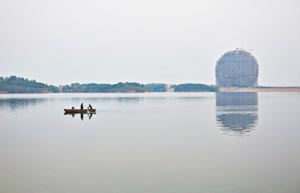

In China, it started off trading a chemical compound called urea, then switched to producing alternative forms of energy, animal feed and new materials, among other businesses. The R&D center in Zhangjiang focuses on new materials and food materials. Its task is to serve the Chinese market and ensure that all of the company's R&D centers share their findings.
"Zhangjiang releases a development report each year. But apart from the criteria laid down by the Ministry of Science and Technology, it also has its own goals to meet. By 2020, Zhangjiang will satisfy all of the national-level criteria, as well as its own goals, to grow into a world-class industrial park," said Hou Jin, deputy director of the zone's management committee.
Jiang said that new incentives are needed to attract large multinationals, aside from favorable land policies and tax breaks.
He suggested providing a level of financial support equivalent to their achievements in terms of saving energy and adopting environmentally friendly practices. This aligns with Beijing's recent calls for industry to reduce emissions and save energy.
The United States has benefited from adopting similar measures, Jiang said.
"It's not hard to do the math, and such a measure would do a lot to support local residents in terms of improving the environment (and thus their standard of living)," he added.
 A day in the life of a car model
A day in the life of a car model
 Vintage cars gather in downtown Beijing
Vintage cars gather in downtown Beijing
 Asia Bike Trade Show kicks off in Nanjing
Asia Bike Trade Show kicks off in Nanjing
 Student makes race car for 4th Formula SAE of China
Student makes race car for 4th Formula SAE of China
 Beijing suburb to hold 2014 APEC meeting
Beijing suburb to hold 2014 APEC meeting
 Belgian, British scientists share 2013 Nobel Prize in Physics
Belgian, British scientists share 2013 Nobel Prize in Physics
 Model with modified BMW X6 M SUV
Model with modified BMW X6 M SUV
 'Golden Week': No pain, no gain
'Golden Week': No pain, no gain